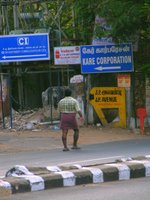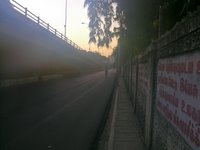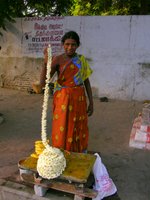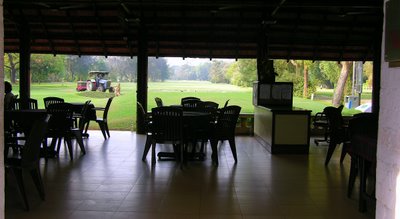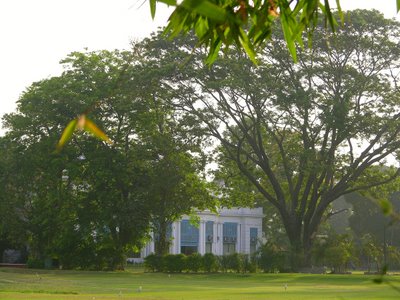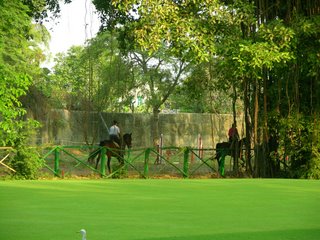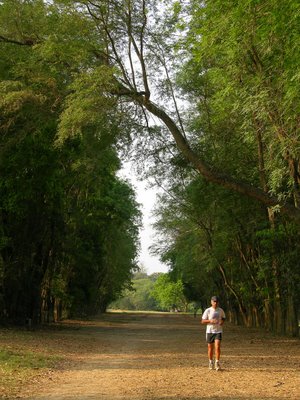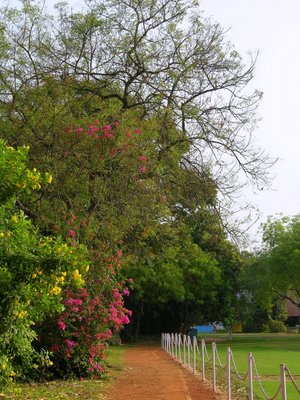Damned if we do, damned if we don’t.
As a civil servant, I should steer clear of political discussions in public. I try to toe that line even in this space, where I am (supposedly) anonymous and (fortunately) faceless. Arnab, however, has no such constraints or compunctions, hence this debate over on his blog. Strewth! (One expects Bongs to get het-up over these things - in fact, we get het-up over damn near anything - but do note the paar-sawn phrom Waste-arn ishtet who’s got his knickers in a twist there.)
One particular coalition has formed the government in this state since 1977. This coalition has just won the Assembly elections for the seventh time in a row. In previous elections, there have always been allegations of rigging and intimidation. This time round, the Election Commission seemed to adopt a “French law” approach – guilty until proven innocent – and took unprecedented precautions to ensure fair polling.
Over the last two months, there have been endless discussions of how two EC initiatives would affect the ruling coalition. First, the rigorous correction and updating of the electoral rolls, whereby two and a half million supposedly “bogus voters” were struck off. Second, the pervasive scrutiny through the EC’s Observers and the security with para-military forces; in both cases the numbers were increased four-fold. The consensus was that this would totally rule out the coalition’s “scientific rigging” and therefore have an adverse effect on their poll performance.
The results - they now have 235 seats, up from 199 the last time. Regardless of whether this is a vindication of the Left Front, I am happy for a personal reason.
****
Over the last 17 years, I’ve worked in four major (Parliamentary / Assembly / simultaneous) elections and a slew of minor (municipality / Panchayat) ones. I am sick and tired of the assumption that the “administration” actively aids the ruling party during elections. The nudge-nudge-wink-wink, “so did you safeguard your job this time?”, “oh, you guys have the results ready before the polls open” – even though nobody has ever said this to my face, it rankles when I hear these insinuations about some friends and colleagues whom I believe in. Wonder what the same cynics will say this time?
The layman just sees the lines in front of the booths on poll day. Very few people appreciate the years – yes, years – of effort that go into the process, starting with the preparation of the electoral rolls and the voter ID cards (the latter an EPIC* exercise, ha, couldn’t resist that). And this is before polls are even announced. All hell breaks loose after the announcement of polls.
Indian electoral regulations must be the world’s most detailed. Every damn step from the publication of the rolls to the identification of the agents for counting of votes is covered by about 371 different rules. I kid you not. Even after the introduction of Electronic Voting Machines, each polling party carries a mind-numbing assortment of statutory and non-statutory “Covers and Forms”. They carry sealing wax, lanterns, file tags, spare ink. At the despatch centre, it takes them an hour or so to check off all the stuff against the list. In West Bengal, it’s a survival requirement – chances are that some polling agent will know more than them about dotting the ‘i’s and crossing the ‘t’s and if they don’t follow the procedure to the last detail, that agent will create merry hell in the polling booth. That’s one booth. No district has less than 2500 polling booths. If you’re the district officer in charge, would you take any chances?
That’s the other point about running elections in West Bengal. The level of political awareness is amazing. As a result, every political party knows the ins and outs of election regulations and makes damn sure the administration follows it. Far more so than elsewhere – on duty in another state, I’ve seen a 1 hour delay in the opening of the strong room and issue of EVMs on counting day, candidates and agents waiting without a clue, all because the Returning Officer in question couldn’t do without dyeing his beard on Sundays. In Bengal, that would have sparked a lengthy exchange of faxes and phone calls with the Election Commission, with detailed expositions of the penalties for dereliction of duty under the Representation of the People Act, 1956; there, it was dismissed as a minor procedural glitch.
All in all, election time is high stress and fatigue. It’s quite normal for the entire team at sub-divisional headquarters (even more so than at the district level) to go without sleep for three or four nights in a row, umpteen times during the election period. Allah knows what it does to our efficiency. One slogged one’s (rather too ample) fundament almost to the bone in the pursuit of fair and trouble-free elections (though to be quite frank, one was driven more by professional ego than by any devotion to the democratic ideal.) Wherefore, dear ladies and gentles, it bit like an adder and stung like a serpent when supercilious so-and-sos sneered at our impartiality. Many thanks to the Election Commission for doing an ISO-2001 and vindicating our efforts. Would that they had done it sooner.
****
I shouldn’t comment on development either. For nearly four years, I was a glorified traveling salesman for the State. Please note, a salesman for the State and not for the government. I believed in the product and still do, so my views are not impartial.
One phenomenon I have noted is that Bangalis outside West Bengal are the most virulent critics of this state. Very few of them will ever admit that there is anything of worth here. The standard response is “Okhaney kokhono kissu hobe naa!” (Nothing’s ever going to change there). I wonder why this is so. Perhaps the answer lies in a conversation three years ago with an honourable exception to this rule. He was quite clear about the reason. His fellow Bangalis on the East Coast of the USA, he said, sought to convince themselves that they were better off there than they ever could be back at home. Wherefore the criticism of all things in Bengal.
This could be true. Against this, I offer the succinct summary offered by my friend who chucked up the fast track (INSEAD, Gothenborg, Harvard, Monitor Consulting) and came back – “The West may have a higher standard of living, but here we have the best quality of life”. Worth a thought.
****
There’s also one thread of the debate on Demented Mind that rubbishes Bengal and Bengalis for putting up with the same government for 29 years. Matter of opinion. I shan’t comment, since I’ve only voted once in my life and it wasn’t this time.
There are, however, some unfavourable comparisons with other states. Apparently other states have advantages that my state doesn’t. From within the system, I must admit that my state does lack in some sterling practises. To wit …
I have never seen or even heard of a politician in this state, let alone a civil servant, prostrate himself before a Chief Minister or any other politician. In seventeen years, I have heard of only one instance where a district officer was transferred and had to pack up and leave post-haste. Post-haste in this case meant about a week, not 12 hours, and this was not because of any differences with the ruling party but over a failure of the administration that stayed in the national headlines for some months (it has even re-surfaced occasionally over the years).
I have never heard of a senior civil servant having to prepare chewing tobacco for a politician’s delectation. I have never had to visit the office of any political party to “pay respects”, nor has this “lapse” led to any setback in my career. Party visit, hell, I can wager that there isn’t even a single picture of the Chief Minister or any political icon** in any government office in this state. This is in sharp contrast to my experience in another state, where I unwittingly stirred up a hornet’s nest by asking a Returning Officer to remove a 2’x3’ picture of the Chief Minister that hung behind his chair.
I have had differences (sometimes very “heated differences”) with elected representatives of all hues, albeit over specific issues. This has never brought forth any threat to damage my career, let alone any threat to my life or my family’s security.
Above all, in a state whose population has diverse religious orientations and the potential for “communal” conflagrations, I have never seen any political interference in any situation of communal conflict. On the contrary, my colleague has defused a potential riot by arresting a local leader (of “a certain community”) from his bedroom at midnight. And not a cheep from the Secretariat. A sharp contrast to the experience of my friend in another state, who was specifically directed not to interfere while the streets ran with blood.
This is something I feel strongly about. In a conflict situation, it is not the business of the government to sit in judgement and then back one side or the other. That’s not the rule of law. The government’s job is to ensure that the common citizen does NOT take the law into his or her own hands. If necessary, this should be done by scaring the s**t out of all parties involved. No harm in that if it stops Ate, who would otherwise “cry havoc / and let slip the dogs of war”.
And please, don’t drag up “pseudo-secularism”. I agree that our country is about as truly secular as the USA, perhaps even less so, but that is no justification for any government to stand by and watch its own citizens being butchered. Again, I accept that this has happened at different times against different communities and with the support of different political parties. I do not hold a brief for any particular party, I’m just proud that it does not happen in my state.
Wherefore, dear commenter on Demented Mind who extols the virtues of development, I am actually happy to live and work in my own state. There are problems, I don’t agree with my political masters on all points, there are obstacles to some of the things I want to achieve, but on the whole there is a level of civilized debate and no fear of pogroms.
As a some-time student of political science, however, I must point out that the biggest problem this state faces today is not power or infrastructure or unemployment. It is the lack of an effective opposition. Would any kind critic care to stand up and be counted by doing something in this regard? Put your money where your mouths and keyboards are, sires.
* EPIC – Electoral Photo Identity Card
** The exception is “Netaji” Subhash Chandra Bose, whose portrait (usually against a totally puke-inducing blue background) can be found in most government offices. While he was one of the foremost figures of the nationalist movement, he also founded the Forward Bloc Party which is one of the partners in the Left Front.
**** ****
 St. Mark’s Cathedral was right opposite my hotel. As I passed the wrought-iron gate I could see the portico, the watchman an ominous shadow crouching from the neon glare. And so to bed … If I’d known what Tuesday held in store I might not have bothered to get out of bed. But that’s another day, maybe even another story.
St. Mark’s Cathedral was right opposite my hotel. As I passed the wrought-iron gate I could see the portico, the watchman an ominous shadow crouching from the neon glare. And so to bed … If I’d known what Tuesday held in store I might not have bothered to get out of bed. But that’s another day, maybe even another story.


